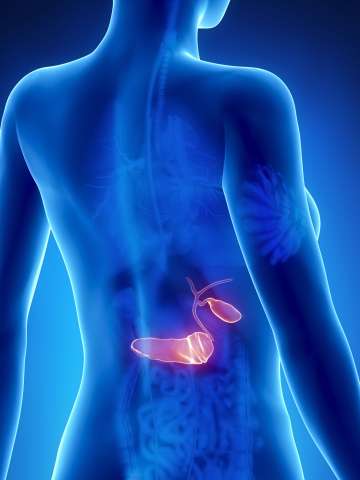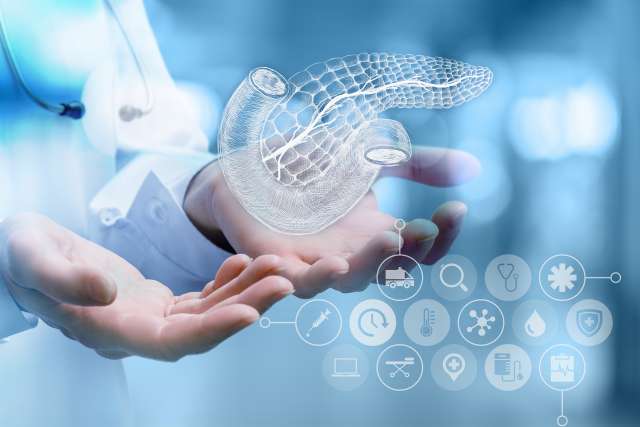Islet Cell Transplant
UCLA Health is one of only a few hospitals worldwide that offers autologous islet cell transplants. This groundbreaking procedure lowers your risk of developing diabetes after pancreas removal.

Why choose UCLA Health for islet cell transplantation?
UCLA Health offers surgery to remove the pancreas while preserving islet cells. Islet cells produce insulin, so an islet cell transplant lowers your risk of developing diabetes after pancreas removal.
We are one of only about 20 programs nationwide with the skills and expertise to perform this advanced procedure. Our program brings you world-class treatment for pancreas inflammation (pancreatitis) while preventing diabetes after pancreas removal.
Highlights of our program include:
Pain relief with lower risk of diabetes: Pancreas removal (pancreatectomy) relieves the severe pain of inflammation in the pancreas (pancreatitis). Usually, your body can’t reduce insulin after pancreas removal. But by transplanting islet cells back into your body, you may continue to produce insulin. This reduces your risk of developing diabetes mellitus.
Highly specialized treatment: Before, during and after surgery, you receive collaborative and compassionate care from experts at the UCLA Health Agi Hirshberg Center for Pancreatic Diseases. To prepare the islet cells for transplant, we partner with experts at the University of California, San Francisco.
Experienced team: Our team performs more pancreatic surgeries than most centers in Southern California. This high level of expertise means you benefit from a lower risk of complications and better outcomes.
Whole-person approach: Pancreatitis is a chronic, painful condition. We understand that you may have been coping for a long time with severe pain, perhaps for years. Our team helps relieve your pain and manage the medications used to treat it.
Convenient, one-stop location: The Agi Hirshberg Center for Pancreatic Diseases is a centralized clinic where specialists exclusively treat pancreatic diseases. Having a team of experts at the same location helps you get treated quickly with fewer appointments and shorter wait times between specialist appointments.
What is an auto islet cell transplant?
An islet cell transplant may be an option if you need a pancreatectomy, or pancreas removal. Pancreatectomy typically removes the pancreatic islets. But without islet cells, you can’t produce insulin. As a result, you develop type 1 diabetes.
An autologous islet transplant means we return your own islet cells to you, and your body can continue making insulin. Removing all or part of the pancreas can relieve pain from inflammation. The islet cell transplant minimizes your risk of developing diabetes after surgery.
Who is eligible for auto islet cell transplant?
We offer islet cell transplantation for adults and children with severe, chronic pain from pancreatitis. Our islet cell transplant team evaluates you to determine your eligibility. We review your symptoms and overall health. You also have a general surgery evaluation.
You do not need to be placed on a transplant waiting list for an islet cell transplant. The islet cells you receive are your own, so there’s no need to wait for a donor.
How does an islet cell transplant work?
In autologous islet cell transplantation:
- You have a presurgical evaluation and choose a date for surgery.
- Your surgeon removes your pancreas.
- Our team collects islet cells from the pancreas and transplants your own islet cells into your liver, where they gradually regain function. You have only one surgery.
- You stay in the hospital for up to a week or two. Our expert pain management team helps you wean off pancreatitis pain medications, if needed.
What to expect after islet cell transplant
After you leave the hospital, you continue to have follow-up care from a UCLA Health endocrinologist. Your endocrinologist prescribes insulin immediately after surgery while your transplanted islet cells “rest.” They help you lower insulin doses or stop taking it completely over the next several weeks and months.
Unlike other types of transplants, you don’t need to take medicines to keep your body from rejecting the transplant (immunosuppressive medications). Because the islet cells are your own, there’s no risk that your body will see them as foreign or attack them (transplant rejection).
Does an islet cell transplant prevent diabetes?
Islet cell transplants can prevent diabetes from developing in some people after a pancreatectomy. Generally, islet cell transplants result in better outcomes for people who have had pancreatitis for a shorter time. Over time, the chronic pancreas inflammation can damage the islet cells so they no longer produce insulin.
Our results mirror those of islet cell transplant programs globally:
- About 1 in 3 islet cell transplant recipients need no insulin at some point after the procedure.
- Another 1 in 3 recipients require some amount of insulin.
- Some patients can’t produce enough insulin after surgery. They must take typical amounts of insulin.
Even individuals who do need insulin after the procedure eventually have greatly reduced pain or may be pain-free.
Meet the team
Our surgeons are at the forefront of groundbreaking transplant care. We are one of only several centers in the nation that offers islet cell transplants. Our physicians are clinical leaders and active researchers who bring you the most up-to-date treatments and promising new therapies.
Transplant Surgical
Transplant Medical
Contact us
Call 310-206-6889 to request an appointment with an islet cell transplant specialist at UCLA Health.
Find your care
Our team offers whole-person, advanced care. Call 310-206-6889 to learn more about islet transplantation.








